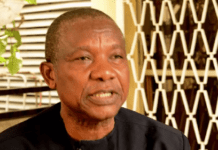Tokyo Olympics organisers said news of a coronavirus vaccine was a “relief” on Tuesday but insisted their bio-security planning for the postponed Games remained unchanged.
Olympic officials have regularly said that a coronavirus vaccine is not a precondition for staging the Games, now scheduled to open a year late in July 2021.
But they have acknowledged that a successful shot would make their task significantly easier and welcomed the 90 per cent effectiveness shown by one trial vaccine.
“The organising committee is not disconnected from society… and I heard the vaccine news,” Tokyo 2020’s Games delivery officer Hidemasa Nakamura told reporters at a briefing.
“And the organising committee is feeling the same as you probably felt, positive sentiment and relief,” he added.

But he added: “What we are doing right now is not thinking about the vaccine, because we don’t have a vaccine yet, but rather focusing on testing, social distance and also the cooperation between the athletes and the other stakeholders.”
“I think that is what we need to do to create a safe Games.”
Global markets and sentiment soared after US pharmaceutical giant Pfizer said tests involving more than 40,000 people had provided results that were a “critical milestone” in the search for a vaccine.
The news is likely to be a shot in the arm for Japanese officials and their Olympic counterparts, who have faced continuing scepticism about whether the Games can be held next year if the pandemic is not under control.
On Sunday, Tokyo hosted its first international sporting event since the pandemic, a four-nation gymnastics meet that organisers hailed as proof the Games were possible despite the virus.
While the event involved only about 30 athletes and 2,000 socially distanced spectators, Nakamura said it was still evidence that the Olympic and Paralympic Games are feasible.
“Ultimately the Olympics and Paralympics are an accumulation of each competition in each venue, so the fact that a competition was held in November in a safe manner is a huge message,” he said.
Sunday’s event featured stringent rules for foreign athletes from the United States, China and Russia, who travelled on charter planes and were restricted to designated hotel floors, assigned buses and competition venues.
Athletes had to isolate themselves before coming to Japan and test negative 72 hours before arrival. They were also tested every day after their arrival.
Spectators at the event had to wear face masks, sanitise their hands and undergo temperature checks and were told not to shout or cheer.
International Olympic Committee chief Thomas Bach, who is due in Japan next week for the first time since the Games were delayed, said the event had set “an example that sports can be organised safely even under the ongoing health restrictions”.
(AFP)













